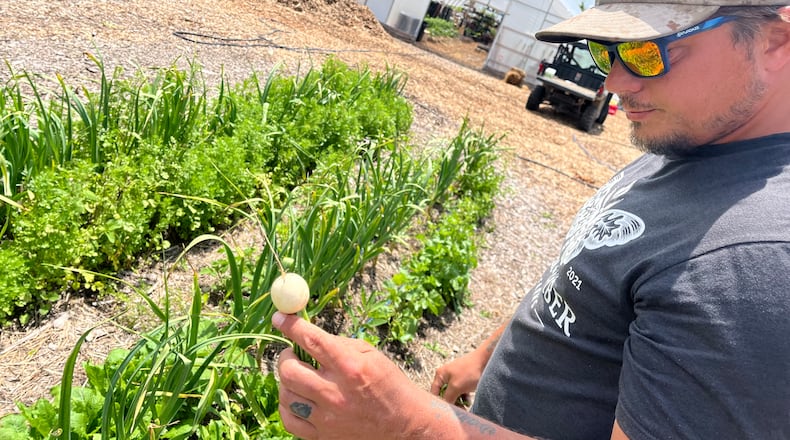The beginning
Oak & Ember Farms is a 36-acre regenerative farm with 10-acres of forest and a 5-acre lake at 2645 Olt Road, just outside of Dayton in Jefferson Twp. Harrison’s goal is to create an agritourism destination.
“To have an agritourism operation you have to be a farm first and foremost, that’s the easiest way,” Harrison said. “Coming out of the hospitality industry, the original idea was to create community garden spaces specifically designed for chefs.”
Credit: Natalie Jones
Credit: Natalie Jones
Before he could do that, he had to start working the land and reclaiming it. Harrison found the property in April 2021 and got right to work. The property was previously owned by the Shield’s family — known in the Dayton region for their barbecue.
Harrison said much of the farm was covered in invasive plants like honeysuckle and overgrown weeds and brush. Between his team and volunteer efforts, they have spent close to 20,000 hours in the last three years reclaiming the land. The goal was to re-establish the hay fields and prairies.
When Harrison first started the farm it was a solo project, but he quickly found out he couldn’t do it by himself. He said he is collaborative by nature, so he brought in several likeminded partners from the Dayton community to help.
Farming for chefs
In the summer of 2022, Oak & Ember Farms started working with REGENERATE Garden Co. to bring a new sense of energy and life into the space.
“Growing food is one of the hardest things you can possible do, especially without doing big commercial, share crop-style farming,” Harrison said.
Credit: Natalie Jones
Credit: Natalie Jones
It made sense to team up with REGENERATE Garden Co. to get the farming started — especially with chefs not having the time to build-out and maintain their own garden spaces. In Dec. 2022 they broke ground on a greenhouse and in spring 2023 they started building a market garden and nursing space.
Oak & Ember Farms is going into their second year of working with local chefs at Sueño, Tender Mercy, Grist, Joui Wine, Tony and Pete’s and CULTURE.
“Working with chefs has been so much fun, especially coming from that industry,” Harrison said. “It made a lot of sense.”
Their relationship with chefs is very collaborative where they discuss what they want and how much of it they will need.
In the greenhouse alone, they grow upward of 50 different crops including tomatoes, peppers, herbs, root vegetables, greens and edible flowers. This past week they were harvesting and delivery cool season crops such as radishes, turnips, lettuces and collards to local restaurants.
Credit: Natalie Jones
Credit: Natalie Jones
Why buy local?
“Chefs that use our food, they have a more intimate dynamic understanding of it than most places because our relationship is so intentional,” Harrison said.
The chefs know what’s going into the crop and who is touching it.
From Harrison’s experience in the hospitality industry, he said it was important to him that he was making sure his customers were getting the best product possible. He wanted to have a keen understanding of what he was giving to people.
“With local stuff you really have an understanding where it’s coming from, how it’s getting produce,” Harrison said. “Obviously, you can take the time to figure some of these things out on a more commercial scale with some of the places you buy food, but it takes some more work.”
Buying produce from Oak & Ember Farms not only allows transparency, but it keeps money inside the local community and provides an opportunity to share the farm’s story.
Regenerative farming
Oak & Ember Farms uses regenerative methods when farming. This means they do not use chemicals and everything in their process is natural from working the ground to harvesting.
In a perfect world with tons of time, they would start a 30 foot by 30 inch row six to nine months before it’s time to harvest. First, they would lay a black tarp down with the black side facing up. This allows the sun to bake what’s under the tarp — getting rid of weeds and grass without using chemicals.
Next, they would use a broad fork to “aerate” the soil, allowing the root system of the new plant to go deeper. They would then put cardboard on top and cover it with six inches of organic compost. Within a month, the cardboard is broken down.
The goal is to create a dynamic soil profile that helps enhance the flavor and nutrient of the food, Harrison said.
“Overtime you’re creating that palate,” Harrison said “It’s more important than what you’re harvesting each individual time. If you can create that palate then you can grow whatever you want.”
Most of the operation at Oak & Ember Farms is off-grid — meaning they have no power and only use city water when cleaning food. To water the plants, they use water that is harvested through the lake and fed through rain water. They have a system in place where the water goes through filtration and into drip systems.
Power is harvested through solar and Harrison said they sometimes use gas generators.
Finding a home before they grow
Because Oak & Ember Farms takes care of its crops thoughtfully and intentionally, “the idea of wasting food is a huge travesty,” Harrison said. “We do everything we can to make sure it gets into the hand of someone.”
If a chef needs 20 pounds of something one week, but only 12 pounds the next week, they have eight extra pounds to sell to other area chefs or to the public.
“The idea is that the food and anything that we are growing or farming has a home before we grow it,” Harrison said.
Oak & Ember Farms is planning to launch a limited summer CSA. Customers will be able to pay for a monthly or weekly subscription to receive a box of food.
The farm started a CSA for flowers earlier this year. Local entrepreneur Carly Short, who is the co-owner of Heart Mercantile and LUNA Gifts & Botanicals, is leading the cut-flower subscription program.
What’s new at Oak & Ember Farms?
Other new things this year on the farm include public hours. Oak & Ember Farms is open 10 a.m. to 2 p.m. Wednesday through Saturday.
Credit: Natalie Jones
Credit: Natalie Jones
“The farm is open to the public,” Harrison said. “We want people to get out here and just be excited about what we’re doing.”
Visitors can shop the nursery, walk around the farm or lend a hand. Volunteer hours run 10 a.m. to 2 p.m. Tuesdays and Saturdays.
“What we see especially with our type of farming there’s a lot of transfer of education and empowerment that goes into our volunteers,” Harrison said. “Anything that we grow here on the farm and the way we do it, can be done at anyone’s house.”
Oak & Ember Farms has also launched minimal camping sites that can be booked via campspot.com. In the future, they plan to expand to glamping structures, cabins and potentially a full-scale lodge. They’re also offering rental use of the farm for events.
Other things to expect at the farm this year include several chef dinners and a Christmas-style festival benefitting their nonprofit organization. The Oak & Ember Foundation works with Kettering Alternative Program (K.A.P.), a division of Fairmont High School, to engage students through nature and regenerative farming immersion. The students have their own garden spaces that they maintain and work.
Having passion for people
Oak & Ember Farms had partnered with Fairmont High School before they even started growing food. Harrison, a 2002 graduate from Dayton Christian, has always had a passion for making a mark on people’s lives.
Credit: Natalie Jones
Credit: Natalie Jones
It started with his parents who have lived a life of service not only through faith-based ministry, but how they operated as a family. Harrison said growing up he watched how his parents treated, loved and gave to people.
He started in the hospitality industry in high school with his first job at Subway and waited tables in college through his late 20s. In his 30s, he started leaning into more entrepreneurial efforts and was a founding managing partner at Table 33 until he sold his half before Covid.
Now at 41, he hopes to create a place for collaboration and a place where people can be and belong
“Oak & Ember Farms is a rival of the soil and the soul,” Harrison said. “We’re here to revive people and to revive the soil all at the same time.”
For more information about Oak & Ember Farms, visit the farm’s Facebook or Instagram pages (@oakandemberfarms).
REACH OUT
Natalie Jones writes about food and dining in Dayton and the Southwest Ohio region. If you would like your business to be considered for this feature, email natalie.jones@coxinc.com or find her on TikTok (@natalie_reports) and Instagram (@natalie_reports937).
About the Author






